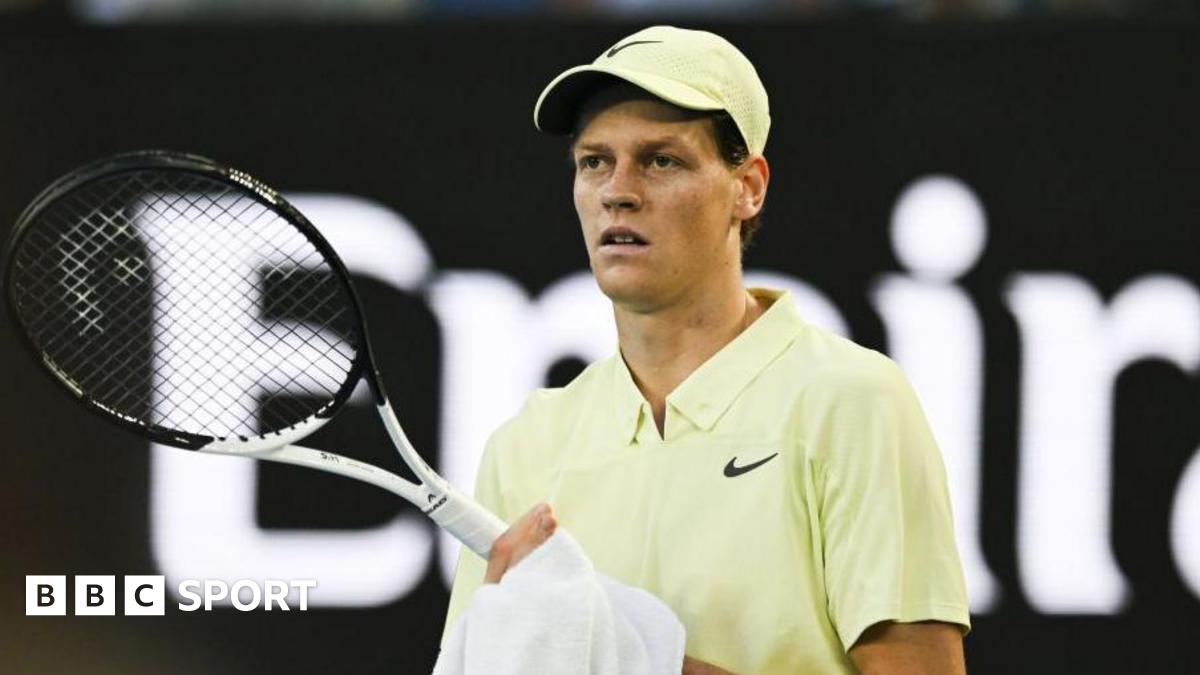Sad day for tennis - Sinner doping ban leaves sour taste
- BBC News
Jannik Sinner won his third Grand Slam at the Australian Open in January
Jannik Sinners doping case has divided the tennis world for months, with the announcement he will serve a three-month ban leading to further questions.
Some players have said "they dont believe in a clean sport any more", while others say Sinner is "taking responsibility for the mistakes of others".
The World Anti-Doping Agency initially sought a ban of up to two years but reached a settlement after accepting the Italian inadvertently ingested a banned substance and "did not intend to cheat".
The world number one has not been on court since his Australian Open triumph last month and will now be banned until 4 May, returning in time to begin preparations for the years second Grand Slam at the French Open.
Current and former players have criticised the decision, with Switzerlands three-time Grand Slam champion Stan Wawrinka posting on X: "I dont believe in a clean sport any more..."
Tennis pundit and former British number one Andrew Castle told BBC Sport: "Any talk of settlement or agreement when it comes to drug bans or suspensions makes people feel very uncomfortable.
"Theres a huge reputational risk for the man who is world number one but also for tennis as well.
"But you cant say that these sorts of cases should be black and white."
Former British number one Tim Henman told Sky Sports: "When I read the statement this morning it just seems a little bit too convenient.
"Obviously having just won the Australian Open, to miss three months of the Tour and therefore to be eligible to play at Roland Garros, the timing couldnt have been any better for Sinner, but I still think it leaves a pretty sour taste for the sport."
Former Wimbledon finalist Nick Kyrgios, who previously said Sinner and Iga Swiateks doping cases were "disgusting" for the sport, wrote: "Obviously Sinners team have done everything in their power to just go ahead and take a three-month ban, no titles lost, no prize money lost.
"Sad day for tennis. Fairness in tennis does not exist."
British player Liam Broady posted: "Didnt realise you could reach a settlement regarding a doping ban… Interesting. Back in time for French Open I guess?"
Former French Open doubles champion Feliciano Lopez defended Sinner, responding to Wawrinka on X: "Its very clear he hasnt done anything to enhance his performance, thats proven.
"Hes taking full responsibility for the mistakes of others. A longer suspension would have made the sport cleaner? I dont think so."
The Professional Tennis Players Association (PTPA) has criticised the apparent inconsistencies between recent doping cases.
Last month it launched a new scheme offering players facing allegations of doping or corruption access to pro bono legal support.
The scheme was co-founded by former British doubles player Tara Moore, who served a two-year absence because of a doping ban which was later overturned.
Reacting to the news of Sinners ban, Moore posted on X: "Can someone explain how a negotiation was possible?"
A PTPA statement read: "The system is not a system. Its a club. Supposed case-by-case discretion is, in fact, merely cover for tailored deals, unfair treatment, and inconsistent rulings.
"Its not just the different results for different players. Its the lack of transparency. The lack of process. The lack of consistency...
"This bias is unacceptable for all athletes and shows a deep disrespect for every sport and its fans."
Former Wimbledon champion Simona Halep has previously accused the International Tennis Integrity Agency (ITIA) of double standards - a claim it has strenuously denied.
Halep was given a four-year ban for two separate doping offences in 2022 which was later reduced to nine months.
Halep was critical when it was announced world number two Swiatek would serve a one-month doping ban in November, posting on Instagram at the time: "I stand and ask myself, why is there such a big difference in treatment and judgment?
"I cant find and I dont think there can be a logical answer. It can only be bad will from the ITIA, the organisation that has done absolutely everything to destroy me despite the evidence."
Sinners lawyer Jamie Singer said the Italians team should bear responsibility for mistakes that led to his failed drugs tests.
The ITIA found Sinner was inadvertently contaminated with the banned substance clostebol by his physiotherapist Giacomo Naldi during a massage.
He said: "Wada has confirmed the facts determined by the Independent Tribunal. It is clear that Jannik had no intent, no knowledge, and gained no competitive advantage. Regrettably, errors made by members of his team led to this situation."
The ATP, which runs mens tennis, said the case was an "important reminder of players responsibility to carefully manage the products and treatments they or their entourages use".
Italian Tennis and Padel Federation president Angelo Binaghi said Sinner would be welcomed with open arms at the Italian Open, which begins in Rome three days after his ban ends.
"This is the first time that a shameful injustice makes us happy because our first thought is for the boy who sees the end of a nightmare," Binaghi said.
"This agreement between the two parties certifies Janniks innocence, his absolute non-guilt, and finally allows him to calm down and plan his future with a great comeback... in Rome."